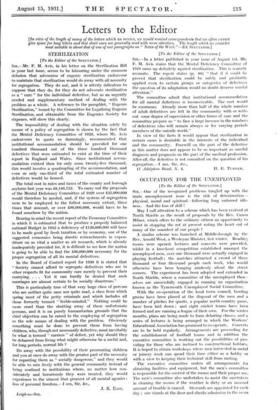Letters to the Editor
[In view of the length of many of the letters which we receive, we would remind correspondents that we often cannot give space for long letters and that short ones are generally read with more attention. The length which we consider most sunabk is about that of one of our paragraphs on" News of the lireek."—Ed. SpEcrxron.]
STERILIZATION [To the Editor of the SPECTATOR.]
Sta,—Mr. F. M. Avis, in his letter on the Sterilization Bill in your last issue, seems to be labouring under the common delusion that advocates of eugenic sterilization endeavour to maintain that sterilization would do away with all necessity for segregation. They do not, and it is utterly ridiculous to suppose that they do, for they do not advocate sterilization as a " cure " for the individual defective, but as an urgently needed and supplementary method of dealing with the problem as a whole. A reference to the pamphlet, "Eugenic Sterilization," issued by the Committee for Legalizing Eugenic Sterilization, and obtainable from the Eugenics Society for sixpence, will show this clearly.
The impossibility of dealing with the situation solely by means of a policy of segregation is shown by the fact that the Mental Deficiency Committee of 1929, whom Mr. Avis endeavours to quote so damningly, recommended that institutional accommodation should be provided for one hundred thousand out of the three hundred thousand defectives that were estimated to exist at the time of their report in England and Wales. Since institutional accom- modation existed then for only some twenty-five thousand, this would involve a quadrupling of the accommodation, and even so only one-third of the total estimated number of defectives would be housed.
The total cost in rates and taxes of the county and borough asylums last year was 18,148,752. To carry out the proposals of the Mental Deficiency Committee of 1929 over £32,000,000 would therefore be needed, and, if the system of segregation were to be employed to the fullest necessary extent, three times that amount, or over £98,000,000, would have to be found somehow by the nation.
Bearing in mind the recent report of the Economy Committee in which it is estimated that to produce a properly balanced national Budget in 1932 a deficiency of £120,000,000 will have to be made good by fresh taxation or by economy, one of the suggested economies being drastic retrenchments in expen- diture on so vital a matter as air research, which is already inadequately provided for, it is difficult to see how the nation is going to be able to find the 296,000,000 necessary for the proper segregation of all its mental defectives.
In the Board of Control report for 1930 it is stated that "Society cannot afford to segregate defectives who are in other respects fit for community care merely to prevent their marrying. . . . Yet it can hardly be denied that such marriages are almost certain to be socially disastrous."
This is particularly true of that very large class of persons who are neither quite sane nor quite mad, a class from which spring most of the petty criminals and which includes all those formerly termed "feeble-minded." Nothing could be more cruel than the shutting away of these unfortunate persons, and it is on purely humanitarian grounds that the chief objection can be raised to the employing of segregation as the sole means of dealing with the problem. Obviously something must be done to prevent them from having children, who, though not necessarily defective, must inevitably be what is termed "carriers" of defect, yet why should they be debarred from living what might otherwise be a useful and, for long periods, normal life ?
Do away with the possibility of their procreating children and you at once do away with the greater part of the necessity for regarding them as "socially dangerous," and they would be able to mix freely with the general community instead of being confined to institutions where, no matter how con- siderately and luxuriously they were treated, they would experience to the utmost that greatest of all mental agonies : loss of personal freedom.—I am, Sir, &c., Leigh-on-Sea. -
J. R. EAST.






























 Previous page
Previous page